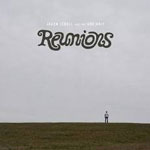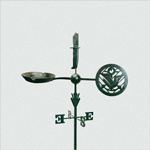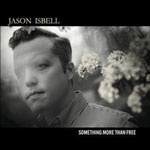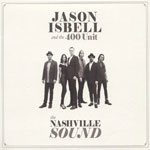Features
If It Takes A Lifetime
Jason Isbell Albums Ranked Worst To Best
by Jason Warburg
The best songwriters are natural storytellers with an intuitive grasp of how to frame and describe an idea or situation in a way that draws the listener in with a handful of carefully chosen words. That holds true whether they are writing about the lives of imaginary characters, real people, or themselves. Beyond that particular skill set and the drive to use it, though, you need one more ingredient: a good story to tell.Jason Isbell has a good story to tell.
Isbell was born in Green Hill, Alabama in 1979, a few miles from both the Alabama / Tennessee line and the legendary Muscle Shoals, and grew up playing music with his family every week. By 15 he was playing in local bands and at 21 he landed a songwriting deal with FAME Studios in Muscle Shoals, where artists including Aretha Franklin, Wilson Pickett and Otis Redding had recorded. Isbell’s songs—typically classified as Americana, though they mix and match rock, country, blues, soul and gospel influences with seemingly effortless ease—often explore aspects of the South he grew up in. As a writer, though, he has always been more a Faulkner than a Van Zant, a man determined to examine unflinchingly the dark corners and contradictions of the human soul.
In 2001, at age 22, Isbell was invited to join the Drive-By Truckers by co-founders Patterson Hood and Mike Cooley; Isbell had been befriended years before by Hood’s father, renowned Muscle Shoals bassist David Hood. Isbell played on the DBT’s 2003 album Decoration Day, 2004’s The Dirty South, and 2006’s A Blessing And A Curse while contributing notable early songs like “Decoration Day” and “Goddamn Lonely Love.” During this period he married bandmate Shonna Tucker and drank and partied heavily. Isbell managed to keep working steadily through what grew into a decade-long bender, delivering his initial 2007 solo album Sirens Of The Ditch with help from Hood and Tucker, but around that same time he and the band agreed to part ways. (The split was amicable and the reasons never clearly stated, but logic suggests that both his burgeoning songwriting talent and his notorious hard living probably factored in.) In 2009, after his marriage had also ended, solo artist Isbell christened his new band The 400 Unit—a nickname for the psychiatric ward at a local Alabama hospital. The center couldn’t hold there either, and by 2012 half the band’s initial lineup was gone, and Isbell’s addictions definitely weren’t.
The thing about hitting bottom is, the only place to go is up. The latter arc is described in bracingly honest, at times downright poetic terms by Isbell’s revelatory 2013 solo album Southeastern. Charting his journey to sobriety with the critical support of his new partner, singer-songwriter-fiddle player Amanda Shires, Southeastern became the launching pad for a new phase of Isbell’s creative and personal life. Two days after recording for the album wrapped, Isbell and Shires married, and two months after 2015’s introspective follow-up Something More Than Free emerged, the couple welcomed a daughter. Two years after that, The Nashville Sound marked the official debut of a revamped 400 Unit, now (and ever since) consisting of Derry deBorja on keys, Jimbo Hart on bass, Chad Gamble on drums, and Sadler Vaden on guitar.
Now six remarkable studio albums into his reborn career, Isbell stands as one of the sharpest and gutsiest singer-songwriters working today, turning out song after song rich with emotion and authenticity. As both a world-class wordsmith and a natural born smart aleck, he’s also one of the most entertaining follows on all of social media—but that’s a story for another day. Here, now, is a look back at Isbell’s brief but potent catalog of solo work, with albums ranked from worst to best. With the roll the man’s been on these past ten years, though, you should probably check back here regularly, as the top five listed below are liable to keep changing.
9. Jason Isbell And The 400 Unit (2009)
One of only two genuinely spotty albums in the Isbell catalog, the record on which he introduced the initial lineup of The 400 Unit was marred by uneven songwriting and production. As my review put it, “he’s still working entirely in characters, still keeping his own heart mostly at a distance from his audience, and the sometimes gauzy and too-often subversive production distracts from rather than amplifies the impact of these songs.” And indeed, in 2019 Isbell released a fresh and improved iteration of this album, remixed by Dave Cobb, who was at the boards for every Isbell release from Southeastern (2013) through Reunions (2020).
 8. Here We Rest (2011)
8. Here We Rest (2011)
Isbell’s second album with the original 400 Unit is another spotty one, notable mostly for three tunes: the dark story-song “Codeine,” the roadhouse boogie shuffle “Never Could Believe,” and perhaps the sharpest of his early solo compositions “Alabama Pines” (“If you pass through on a Sunday, better make a stop in Wayne / It’s the only liquor store open north and I can’t stand the pain / Of bein’ by myself without a little help on a Sunday afternoon”). The rest of the album ranges through heavy blues-rock, upbeat country rock, serious-minded ballads, and r&b and gospel influences, though he’s still feeling his way toward the honesty of his later songs.
7. Georgia Blue (2021)
On election night 2020 the outspoken Isbell declared that “If Biden wins Georgia I’m gonna make a charity covers album of my favorite Georgia songs - REM, Gladys Knight, Vic Chesnutt, Allmans, Cat Power, Precious Bryant, Now It’s Overhead, etc... And damn is that gonna be fun.” Fortunately for all concerned, he is a man of his word. The resulting album is a shambolic hoot, with Isbell joined by a horde of guest stars. While it’s understandably an uneven affair, standouts include the core group’s cover of the Allman Brothers’ “In Memory Of Elizabeth Reed” and their Brittney Spencer-led covers of “It’s a Man’s Man’s Man’s Man’s Man’s World” and the inevitable, yet still outstanding “Midnight Train To Georgia.”
 6. Sirens Of The Ditch (2007)
6. Sirens Of The Ditch (2007)
Featuring much of the then-current Drive-By Truckers lineup, Isbell’s initial solo outing seemed to serve as a catalyst for his departure from the band. Highlights include the chunky, propulsive rocker “Brand New Kind Of Actress” and the stately, haunting “Dress Blues”; the thing is, even on these highlights Isbell is continuing to work in characters, staying at arm’s length from any sort of deep personal truths. What genuinely elevates this album is the performances; “even on his very first outing as a solo artist, Isbell manifests a kind of quiet swagger, a laidback-yet-intense energy that infuses every song with weight and purpose.”
5. Reunions (2020)
Issued under a COVID cloud in April 2020, Reunions never received the notice it deserves, an album that “finds the eight-years-sober Isbell inviting the ghosts of his past back into his consciousness as he revisits a parade of bad choices, regrets, and damage done.” It offers a series of highlights from the aching melancholy of “Dreamsicle” to the ferociously honest rocker “Be Afraid” (“See everyone of us is playing dice / That we didn’t roll / And the loser is the last / To ask for help”). After nine tracks of heaviness, Isbell closes with the touching “Letting You Go,” a heartfelt ballad for his daughter that’s “more than just gorgeous and touching; it feels like a new American standard.”
 4. Weathervanes (2023)
4. Weathervanes (2023)
Isbell’s latest is among his best, a gritty, impassioned set of songs about trying to find your way in a compromised world. From start to finish Isbell and band push themselves to the limit, with highlights including the dark-and-desperate rocker “King Of Oklahoma,” the thrumming, Allman-esque “Middle Of The Morning,” the harrowing, anthemic “Save The World,” and the expansive closing suite “Miles.” Quiet acoustic number “Cast Iron Skillet” emerges as among the most powerful, though, a stunning story-song about interracial love in a small country town. Weathervanes might not be as explicitly autobiographical as past albums, but the intensity of the moods it captures and the strength of the performances make for a powerful record.
3. Something More Than Free (2015)
Though presented as a solo album, this was in fact the initial test run with the modern 400 Unit lineup listed above, who inhabit this remarkable set of songs beautifully. Opener “If It Takes A Lifetime” is a gently lilting song about taking the long view, forgiving yourself, and striving to do better, followed in the album’s terrific opening one-two punch by the jangly, brawny “24 Frames.” The latter features Shires’ keening violin adding an edge to a lyric about “transforming from a person full of illusions to one who sees the world clearly through open eyes.” There’s much more, including the moving “Children Of Children,” about Isbell’s parents, on this stately, serious, and ultimately winning album.
 2. The Nashville Sound (2017)
2. The Nashville Sound (2017)
The first official 400 Unit album since Isbell’s creative and commercial breakthrough Southeastern features one of the strongest sets of songs he’s ever assembled, from introspective country opener “Last Of My Kind” through thundering rockers “Cumberland Gap” and “Anxiety,” pretty ballad “Tupelo,” upbeat rambles “Molotov” and “Chaos And Clothes,” and angry blues “White Man’s World.” Still, the cream of the cream of this crop for me are the stunning love song “If We Were Vampires” and the ringing anthem to optimism “Hope The High Road.” Both quickly became in-concert fixtures, with good reason, and The Nashville Sound remains one of the man’s very best.
1. Southeastern (2013)
It’s tempting to say that Southeastern would still be Jason Isbell’s best album even if there was nothing but dead air after opener “Cover Me Up”—his ballad about getting sober and falling for Shires is that masterful, powerful, and exquisite in every way. But there’s an entire album after it of songs that approach that standard, an album about transformation and hope in the face of adversity that is consistently stirring and captivating. The ballad “Elephant” charts his efforts to comfort a friend dying of cancer; the rocking “Stockholm” and the midtempo “Traveling Alone” offer an honest look at life on the road; the chiming “Different Days” reflects on achieving maturity; and in the late going, “Super 8” offers a welcome blast of witty exuberance. Even the next-tier songs shine like jewels on this damned close to perfect album.